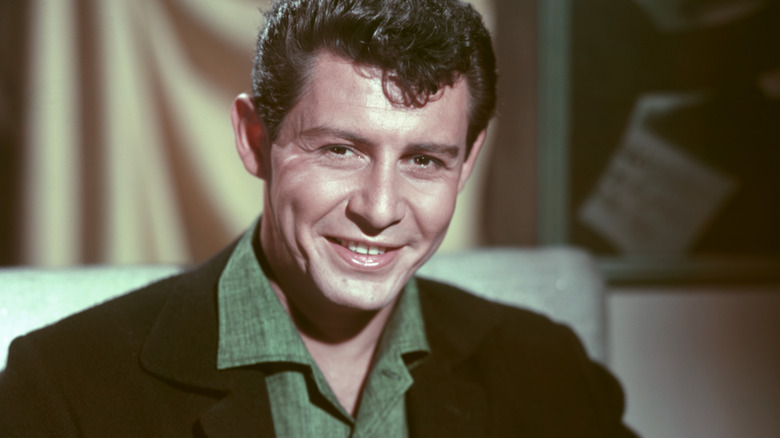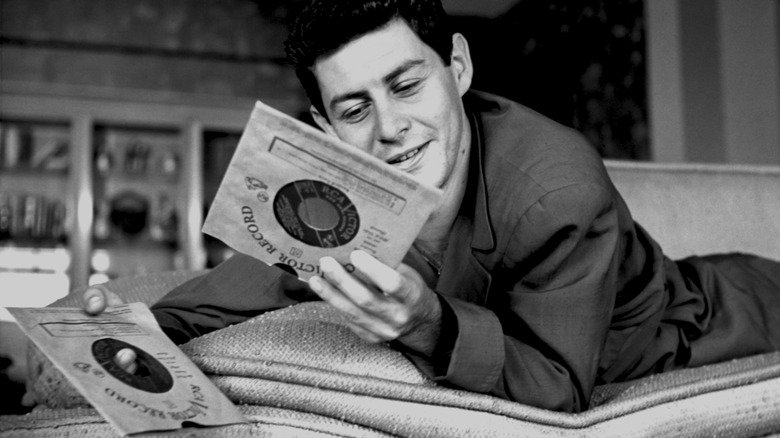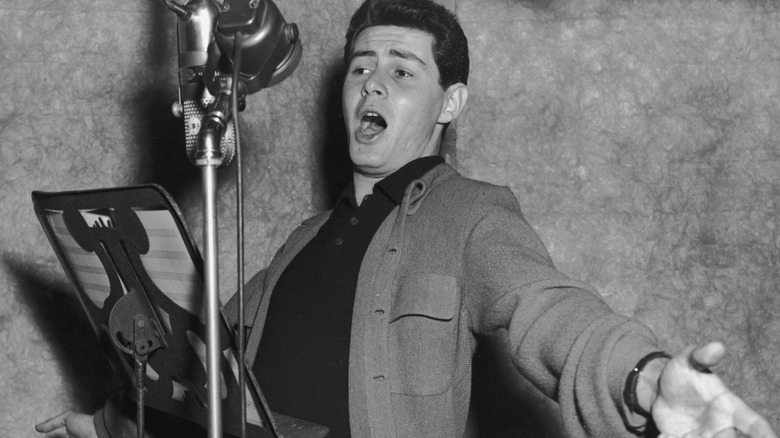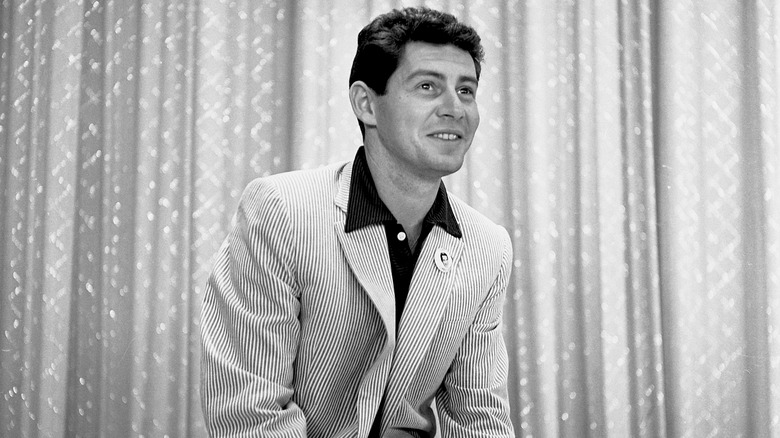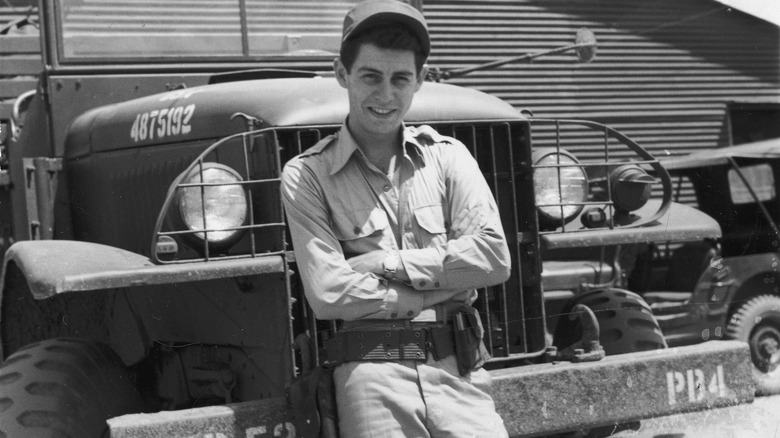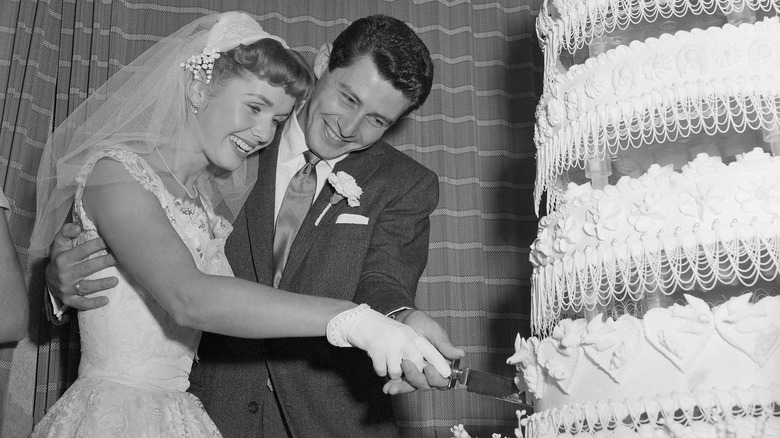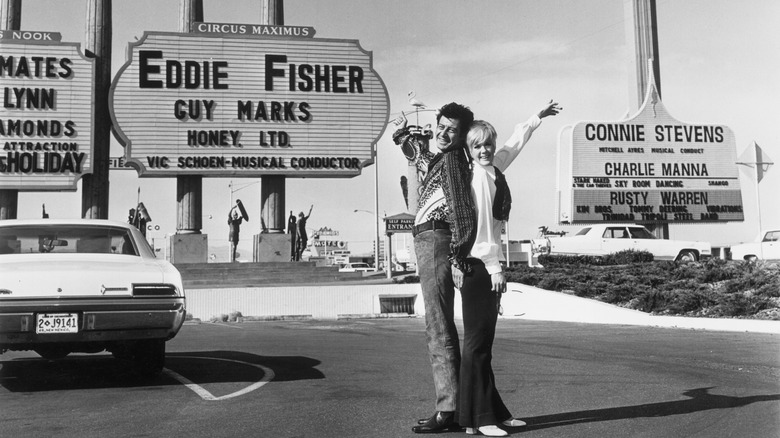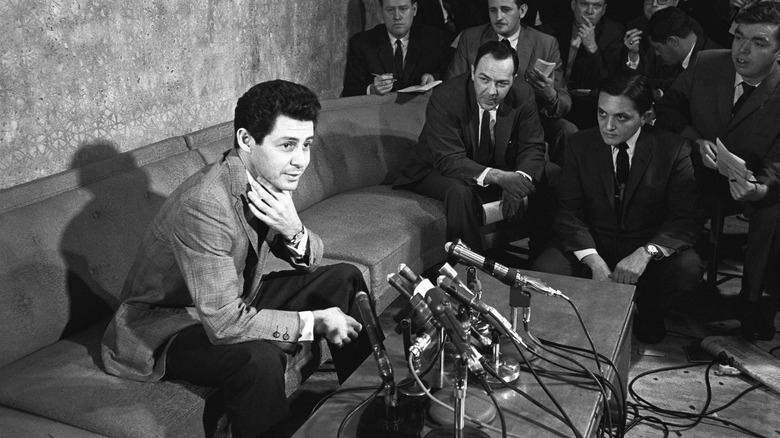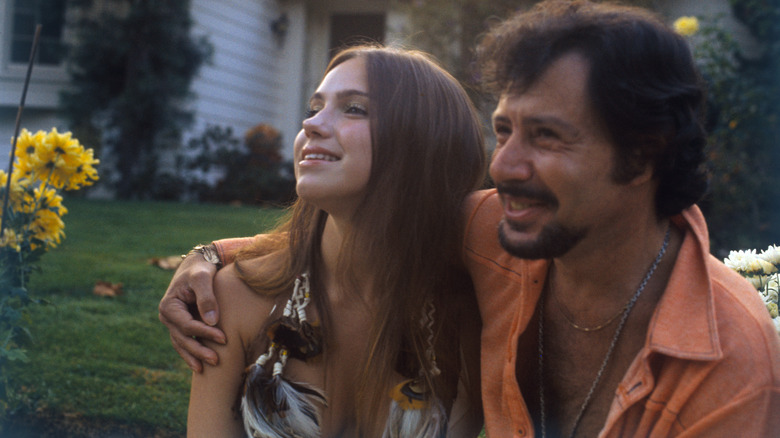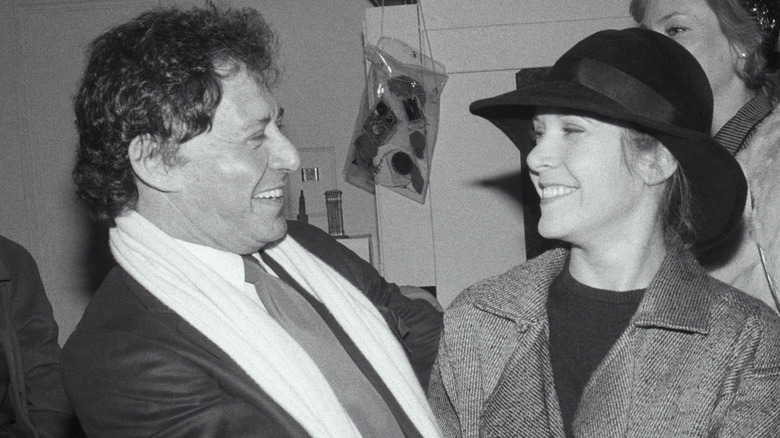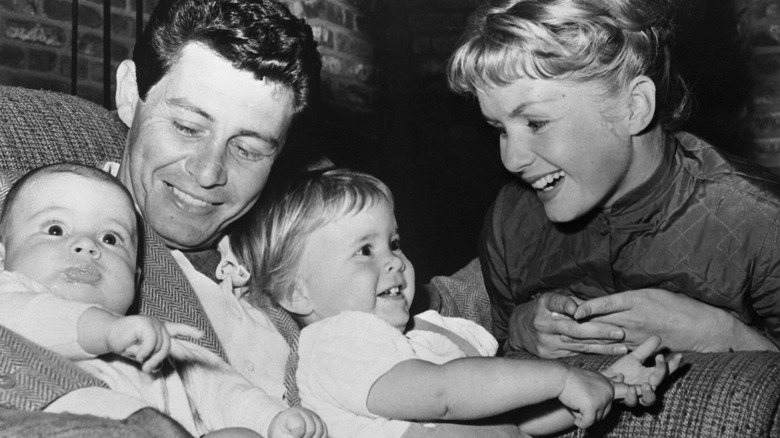Tragic Details About Eddie Fisher
When Eddie Fisher died in 2010, The Guardian lamented the fact that he was remembered more for his multiple wives and the scandals associated with his divorces and marriages than he was for his music. And in his heyday, his contributions to music's popular landscape were almost unthinkable ... especially considering he didn't seem too bothered about what, exactly, he was singing, and the lasting impact it might have.
While his contemporaries chose their songs for meaning and longevity, Fisher once said, "I was too busy making hit records to be concerned about music. [Others cared about] songs that meant something. I didn't." Although he was topping charts alongside people like Frank Sinatra and Perry Como, he'd later have to remind people that he had more consecutive hits than Elvis and the Beatles, and it's worth noting that in the first six years of the 1950s, he had 17 Top-10 songs, and 35 Top-40 hits.
Fisher's popularity would eventually slip away for a few reasons. In addition to his scandalous decision to leave America's sweetheart and his first wife, Debbie Reynolds, for the newly widowed Elizabeth Taylor, his acting career would never take off, and his signature pop sound would lose out to rock 'n roll in a big way. Surprisingly, that was almost the least tragic thing that happened to this one-time, chart-topping superstar.
The following article includes descriptions of addiction and mental health issues.
He grew up with an abusive father
Eddie Fisher would famously say that he was more concerned with putting out hits than meaningful songs, and one of his hits puts that strange statement in a new light. One of his major hits was "Oh! My Papa," and although it's an anthem to a father from his loving son, Fisher's real relationship with his father was anything but. In his 1999 memoir, "Been There, Done That," he recalled singing the song: "When my father came to see me perform I'd look at him lovingly and sing it ... I wasn't much of an actor. ... When I looked at my father lovingly and sang that song, it was the best acting of my career."
He went on to describe his actual father, a Russian Jew who had emigrated to the U.S. when he was 13 years old. Fisher called him "a nasty, abusive man, a tyrant ... loud and shrill and nasty," and said that his angry outbursts were a pretty regular thing. He recalled seeing his father hit one of his brothers, and accused those on his father's side of the family of only starting to acknowledge his existence once he became famous.
He further went on to say that they had constantly treated his mother as though she were unworthy of being part of the family. He wrote, "The only time I ever heard the Fishers say anything kind about my mother was in the limousine on the way to her funeral."
His family lived in extreme poverty
Eddie Fisher's hit television show led to a million-dollar-a-year contract to be Coca-Cola's official spokesman. That was in 1953, which is around $11.2 million in 2022. That's a lot for anyone, and for Fisher, it was literally life-changing. In his memoir "Eddie: My Life, My Loves," he wrote about how some of his earliest childhood memories involved fleeing in the middle of the night and moving to a place where landlords didn't know they couldn't afford the rent.
Fisher said that for a long time, his mother resisted going on welfare — until she could no longer feed her children anything but tea and bread. When she finally went to sign up for relief, she was so weak from lack of food that she passed out while she was standing in line. When they had to pick up clothing and food distributed to needy families, Fisher says that they used a baby carriage to hide what they were doing.
Home was a place with broken and cracked dishes, clothes washed in the bathwater ahead of bathing, and mattresses so full of bedbugs that they were spotted with blood. Fisher recalled growing up and going to school covered in lice, and of seeing bugs on his face when he'd catch a glimpse of his reflection. "I don't have any remembrance of being poor," he wrote. "I just remember being embarrassed, ashamed that this was the way we had to live. ... My hands were always grimy, my fingernails black."
A life-changing opportunity was squandered in a year
Eddie Fisher has been candid about how difficult his childhood was, and it's heartbreaking stuff. Even more heartbreaking than the continued hardship is the fact that when Fisher was around six years old, their family had the chance to break the cycle of poverty and make an incredible life for themselves.
In his memoir, "Been There, Done That," Fisher wrote that in 1934, his father had been awarded a massive insurance settlement after being involved in a car accident that left another person dead. Adjusted for inflation, the settlement was the equivalent of around $113,000 in 2022, and it goes without saying that there's a lot that can be done with that kind of money. Initially, the Fishers went into it with a plan: They opened Fisher's Delicatessen. Fisher wrote that it was truly a family business, and that "It was the only time in my childhood that I remember my father being happy. But it didn't last very long. We didn't know how to run a grocery store ... It only took about a year to lose the entire insurance settlement."
After losing the store, Fisher's father transitioned to trying to make ends meet by buying the less-than-fresh leftover fruit and veg from wholesale markets, then reselling them. Fisher remembered his father using all kinds of shady tricks — like hiding rotten produce under fresh — and wrote, "I was so embarrassed; I hated him for making me feel dishonest."
Then-mysterious injections caused serious side effects
Eddie Fisher's music career was initially put on hold by a two-year stint in the military, and after he was discharged in 1953, it kicked off a grueling schedule that started the same day he left the army. According to his memoir, "Eddie: My Life, My Loves," he was shocked at how he had definitely not been forgotten, and said that his team had decided to capitalize on that. It wasn't long until he was absolutely exhausted, his voice gone. The solution? A man named Dr. Max Jacobson.
Fisher wrote that he was thrilled with the energy Jacobson's mysterious injections gave him, and he continued to get the shots pretty regularly. By the time he was going through his incredibly high-profile divorce from Elizabeth Taylor, he was self-injecting as many as four shots a day, despite regularly suffering from things like tremors, insomnia, and depression.
In 1972, Fisher was mentioned in an expose in The New York Times. The piece focused on what had recently started to come out about Jacobson, saying that Fisher was one among dozens of people who had received mystery injections that included — among other things — amphetamines. Former patients had come forward to say that the injections had caused side effects like addiction, depression, schizophrenia-like symptoms, and at least one death. In Fisher's memoir, he wrote that he was there when the patient fell into a coma and died in Jacobson's office.
His marriage to Debbie Reynolds was doomed before it happened
The scandalous love triangle that existed between Eddie Fisher, Debbie Reynolds, and Elizabeth Taylor was one of the biggest entertainment stories of the decade, and it's not really surprising — people love to read about the dirty laundry of the rich and famous. It turns out, though, that Fisher has said that his first marriage was doomed long before he found himself in the arms of the newly widowed Taylor.
Fisher shared his thoughts on the marriage in his memoir, "Been There, Done That," and he didn't hold back. He said that even as she showed off her ring, he was happy to set the wedding well in the future, to give "enough time for me to figure out if I really wanted to marry her or not." He ended up postponing the wedding, and claimed he went along with it because he thought it was too late to call it all off. He added, "Our marriage was very successful, for at least the first several hours. Unfortunately, by the time the morning newspapers printed photographs ... I was miserable."
He put the blame squarely on her, saying that she was relentlessly argumentative, and that "we grew farther and farther apart." Interestingly, Reynolds would later say that none other than Frank Sinatra had told her not to marry Fisher. She said (via Vogue), "He said, 'Don't marry Eddie.' He said I shouldn't get married to a singer. 'We're not faithful. It's ridiculous for you to take this on.'"
He lost a ridiculous amount of money to a gambling addiction
Eddie Fisher's memoir, "Eddie: My Life, My Loves," revealed that he had a complicated relationship with gambling. Although he started out by saying he was never that into the idea of wagering money on something seemingly random, he then described how his first introduction to high-stakes gambling came from Elizabeth Taylor's then-husband, Mike Todd, and Las Vegas. When he was performing there, he said that he started filling the time between shows at the craps table, and acknowledged why he did it.
"I can't blame Mike for leading me up to the tables. And I can't blame Debbie because sometimes I stayed there for hours rather than be with her. I was running away from no one but myself."
Fast forward to the end of his relationship with Taylor: He wrote in his memoir that he was performing in Las Vegas when those who knew him best pointed out that he was gambling even more — and with higher amounts — than ever before, and at one point, he said that he won $165,000. It wasn't long before he'd lost it again, and he estimated that over the course of the next few years, he lost somewhere in the neighborhood of half a million dollars. "I thought I could afford it," he wrote. "Gambling was a good recreation for me, or so I thought, an addiction no more dangerous than my dependence on Max Jacobson's drugs."
The breakup of his marriage to Elizabeth Taylor devastated him
It was 1964 when The New York Times reported that Elizabeth Taylor had started official divorce proceedings against Eddie Fisher, saying this was not only because they had been already separated for a year, but she also wanted to marry again. Fisher wrote about his side of the story in his memoir, "Eddie: My Life, My Loves," and said that he knew she was hooking up with Richard Burton long before they had officially split: "It was agony for me, waiting to see which of us Elizabeth would choose. But I was so deeply in love with her that there was nothing else I could do."
After the split became official, Fisher started going back to Max Jacobson for his mystery injections. He had another problem: "My left arm was numb with some kind of paralysis which seemed to get worse every time I saw a man and a woman holding hands or kissing on the street."
Today, recovering from a relationship might mean deleting social media, purging photos, and a good, ol' fashioned bonfire, but Fisher wrote that he was completely unable to get away from Taylor. She and Burton were all over the headlines, with magazines reporting on their new relationship and accusations of abuse. "I couldn't read all the stories pouring out of Rome about her affair, and her fights, with Burton without feeling physically ill," he wrote.
Devastating illnesses and another divorce made him take stock of what he had lost
In his memoir, "Eddie: My Life, My Loves," Eddie Fisher wrote about another relationship and a woman referred to only as Marcia. They first got together on New Year's Eve, 1970, and they eventually moved in together. He wrote that things eventually turned toxic, but it led to a series of events that he said really made him stop, take stock of his life, and realize what he'd missed out on.
Around the time that he realized he'd spent around half a million dollars on Marcia, Fisher was handed some terrifying news during a routine physical: He had developed a painful lump that required surgery and testing to determine whether or not it was cancerous. It wasn't, but it wasn't long afterward that Marcia suffered a paralytic episode that was ultimately diagnosed as Guillain-Barre syndrome. She, too, recovered, but health scares put things in perspective.
"During this period, I think I first became aware of how much I once had, and how much I had lost. I had seen other performers plunge from the top to the bottom, but I always thought it could never happen to me. ... It had happened and I felt very sorry for myself."
Speed opened the door to another addiction that almost killed him
By 1973, Eddie Fisher said that he knew he was dangerously addicted to methamphetamine, and in his memoir, "Been There, Done That," he wrote that he had made the decision to get clean. It didn't go as he intended, though, and he said that he was in San Juan when he ran out of his drug of choice. That's also when an unnamed Puerto Rican senator injected him with liquid cocaine for the first time, and he wrote, "Suddenly I was flying like I had never flown before. Within seconds I was off speed and I had a brand-new bad habit."
Fisher wrote that he had an incredibly hard time admitting how dependent on drugs he was, and went on to talk about just how much he was buying. Over the course of just a few months, he said that he was buying 10,000 Seconal (barbiturates), and cocaine to the tune of several hundred thousand dollars' worth. When he finally decided that he was going to quit cold turkey, Fisher dumped about $25,000 worth of the drug, and promptly ended up in the hospital with no idea how he got there.
Fisher ended up going to Zurich's Bircher-Benner Clinic, and wrote that while the treatment worked and he walked out clean, it came with a shocking realization. He returned to LA, and later wrote, "I had no one to help me. Almost everyone on whom I had once depended was gone."
Drug misuse formed the backbone of his relationship with his daughter
Getting clean in Zurich wasn't the end of Eddie Fisher's drug problems. He wrote in his memoir, "Been There, Done That" that he found himself addicted to tranquilizers not long after returning to Los Angeles, and perhaps some of the most telling stories come from his daughter's memoir.
In her book, "Shockaholic," Carrie Fisher wrote that she had been estranged from her father for a long time — until, that is, she called him while she was in the middle of an acid trip. He showed up on her doorstep, and she wrote about how she'd finally cracked the secret to having a meaningful relationship with him: "And who should turn out to long to be cuddled and mothered like the big bad overgrown baby boy he'd always been? You guessed it — Eddie! That's right, I became my father's mother."
Carrie wrote that when he moved into a New York City apartment not far from her, he decided to further their relationship by becoming her source for drugs. "This was when, like most fathers and daughters, we began doing coke together. ... As I've been known to say, in my family, the apple doesn't fall down far from the tree." Carrie, however, held onto a healthy dose of skepticism and realism when it came to her father, saying that she credited two things for destroying his career: His addictions and his scandals. She wrote: "My parents weren't really people in the traditional sense."
Ill health preceded his death from a routine surgery
When Eddie Fisher died in 2010 at the age of 82, much of his obituary in The New York Times was dedicated not to his career, but to his scandalous love life. They noted that a promising career and a gorgeous voice were pushed aside by scandal: the coverage lasted for months, shows got canceled, and he never recovered.
The official cause of his death was complications that followed hip surgery, but even as they reported on his passing, Reuters also reported that Carrie Fisher had made social media posts earlier that same year that suggested he may have been struggling with dementia-like symptoms. He had also apparently been suffering from mobility issues as well.
Although Fisher had, at one point, been riding high with all the prospects in the world ahead of him, doors opened by his golden voice, things didn't play out as he had once expected. His obit also reported that a comment he had made in one of his memoirs had proven to be just as prophetic as he'd perhaps thought it would be. He wrote, "It isn't the music that people remember most about me. It's the women."
If you or anyone you know needs help with addiction issues or mental health issues, contact the relevant resources below:
-
The Substance Abuse and Mental Health Services Administration website or contact SAMHSA's National Helpline at 1-800-662-HELP (4357).
-
The Crisis Text Line by texting HOME to 741741, call the National Alliance on Mental Illness helpline at 1-800-950-NAMI (6264), or visit the National Institute of Mental Health website.
